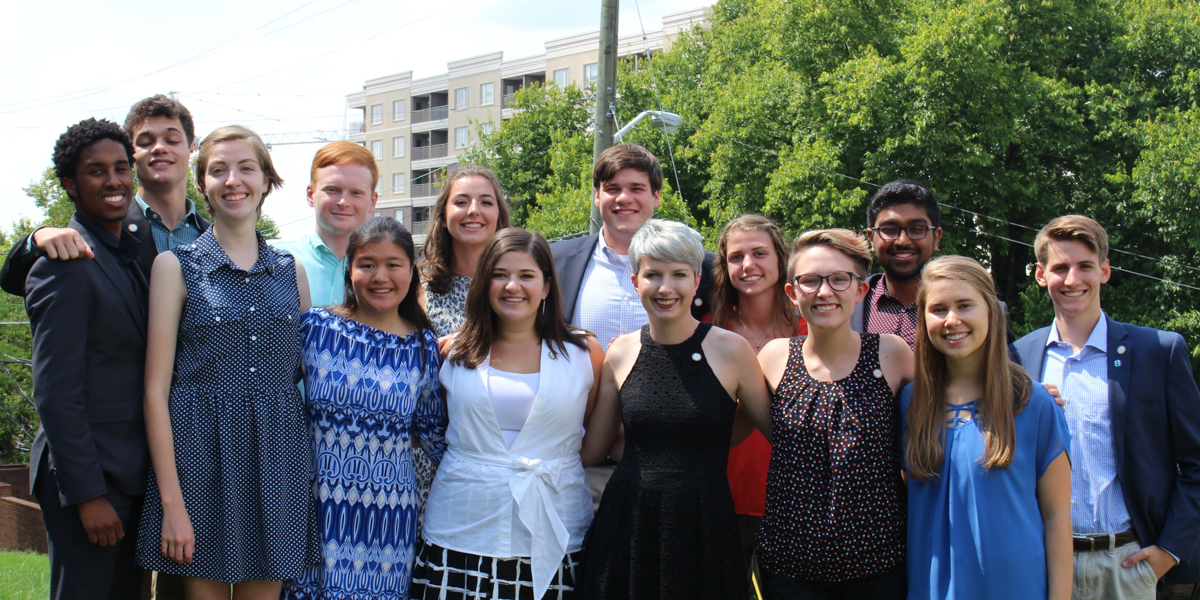By Michaela Faunce
With our extensive work at Pond Gap and Inskip Elementary Schools as Haslam Scholars, we are often recognized for our service in those communities. Collectively, we serve in a Robotics Club, Lego League, a French Club, Science Saturday, two bicycle clubs, a cooking club and two cultural Saturday clubs. We work in classrooms, community gardens, and a circus club. However, we are equally passionate about our leadership development. We have served as class presidents, founders of high school clubs and church organizations, board members, and team captains. These roles have prepared us well for managing the responsibilities of being a Haslam Scholar.

Allison leading an experience learning exercise on Joan of Arc
While a senior in high school, my friend and fellow first-year scholar Alison Flannery was asked to develop a lesson plan to teach a sophomore-level English class while the teacher was out sick. She was president of the Creative Writing Club at the time and had led club discussions about writing, but this responsibility presented an entirely new challenge. Alison had to work with teachers in her school’s English department and the students in the class to better understand what was expected of her and the best ways to go about accomplishing her task.
The experience taught her a great deal about her capacity to teach and love of the classroom setting, and inspired her to work towards earning a master’s in education. She also discovered the importance of community and collaboration in shaping solutions that best serve everyone involved. Alison says she is “reminded of that moment of responsibility in much of what I do in HSP, like entering an entirely new field of study or developing curriculum and lessons for Pond Gap clubs.” She is confident that she can run a club at schools where we volunteer because of the leadership skills and experience she gained in high school.

Leeah and friends modeling clothes for their non-profit
During her high school tenure, my roommate and fellow scholar, Leeah Caple, served on the board of a nonprofit organization called Clothes for Change in her hometown of Charlotte, North Carolina. Clothes for Change works to empower women and girls to promote positive change in their communities. According to Leeah, she was able to “grow as a student and as a young woman” through the club’s support for organizations that advocate for girls’ education, work to prevent sex trafficking, and help women pursue economic independence through microfinance initiatives.
Once on the leadership team, Leeah learned the important roles that integrity and organization play in leading a group of your peers. By practicing these skills, Leeah was able to see firsthand how a group of high school girls could work together to empower other young women. Now she helps our cohort function as a unit and encourages us to empower each other.

Michaela displaying hats made for cancer patients
In my junior year of high school, I became the director of hat operations for Hats for Hope, a 501(c)(3) organization that I started with two other friends to make hats for kids and adults undergoing cancer treatments. Together we enthusiastically created our website, filed the paperwork to become tax exempt, and hosted a fundraiser to kick-start our efforts. However, we also faced a myriad of challenges. We had difficulty opening a bank account for our organization and, just as we were filing our second year of taxes, we had to replace a board member.
Through our challenges and successes we had our parents, mentors, and friends to rely on. During this time, I learned that adaptability and resiliency were key traits of a leader. No matter what obstacle stood in our way, we gathered our resources, made a plan, and overcame. Working with Hats for Hope, I also gained an understanding that my age does not determine the greatness I can create. With a solid network of support like that provided by HSP, my fellow scholars and I can accomplish a lot to benefit our school, our community, and our society.
To form a successful cohort, each Haslam Scholar must recognize that the benefits of working as a team are just as critical as those that come from working individually. We know that a true leader is someone who can put aside their perfectionist ideas of success to lead others to achieve a common goal.
While we all come from a diverse variety of backgrounds and organizations, we share common experiences based on the different types of leadership skills we have learned from our unique positions. Being in multiple types of leadership roles has contributed to our success as well-rounded individuals and helped create a stronger sense of unity within our cohort. We strive to work diligently to leave the program better than when we entered it and to earn respect through our actions. With our past individual experiences and the help of the members, there is no limit to what our cohort can achieve during our time here at the University of Tennessee.
